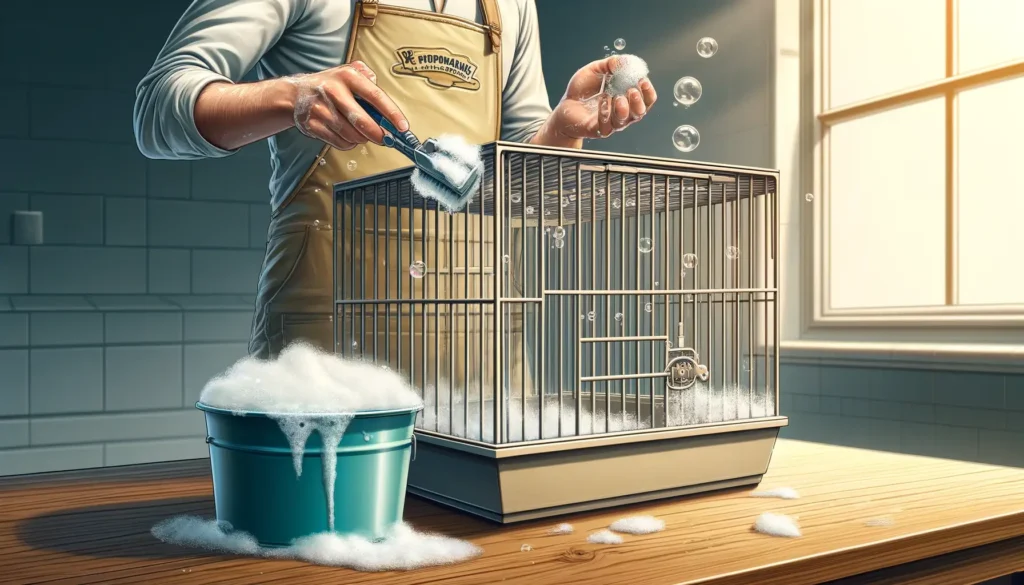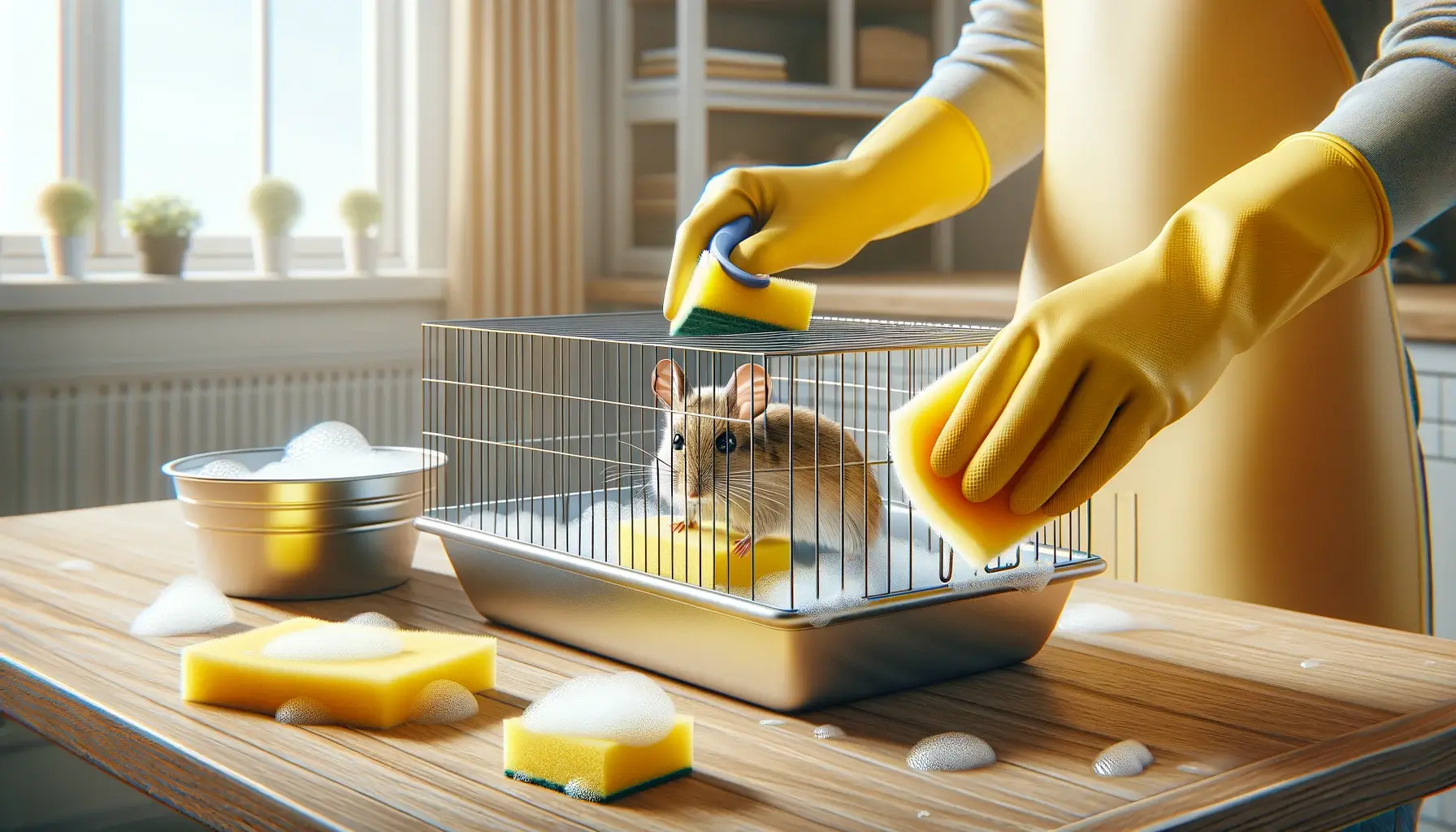Maintaining a clean cage for your gerbil is not just about aesthetics; it’s about the well-being of your furry friend. Gerbils, by nature, are clean animals and thrive in a hygienic environment.
A clean cage prevents the buildup of harmful bacteria and odors, ensuring your gerbil remains healthy and stress-free. Regular cleaning, combined with proper care, can significantly enhance your gerbil’s quality of life.
This guide aims to provide you with a detailed approach to cleaning your gerbil’s cage, covering everything from preparation to the cleaning process itself.
Preparing for Cleaning the Gerbil Cage
Safety First: Securing Your Gerbil
Before you start the cleaning process, it’s essential to ensure your gerbil is safely housed in a temporary enclosure. This could be a playpen, a secondary cage, or even a gerbil ball, provided it’s secure and escape-proof.
The temporary home should be comfortable and familiar, so consider moving a favorite toy or piece of bedding with your gerbil. This helps minimize stress and keeps them entertained while you clean.
Gathering Cleaning Supplies
You’ll need a few basic supplies to clean the cage effectively:
- Mild soap: Choose a pet-safe option to avoid irritating your gerbil’s skin.
- Water: For rinsing the cage and accessories.
- Disinfectant: Ensure it’s safe for use around pets.
- Cloth and brush: For scrubbing and drying surfaces.
Avoid using harsh chemicals like ammonia or bleach, as these can be harmful to your gerbil.
Removing Cage Accessories
Take out all toys, water bottles, food dishes, and bedding from the cage. Cleaning these items separately is crucial to prevent ingestion of soap or disinfectant residues. Wash them with mild soap and water, and rinse thoroughly to ensure they are safe for your gerbil to use again.
Also read: Can Gerbils Live in Bin Cages?
The Cleaning Process

Cleaning Modern Cages vs. Traditional Cages
The approach to cleaning can vary depending on the type of cage you have. Modern cages, like The Qute, are designed for easy cleaning, often featuring removable trays and washable surfaces. Traditional cages may require more disassembly and manual cleaning.
For modern cages:
- Remove and empty the bedding tray.
- Wash the tray and cage surfaces with mild soap and water.
- Rinse thoroughly to remove any soap residue.
- Dry completely before adding fresh bedding.
For traditional cages:
- Disassemble the cage as needed to access all parts.
- Scrub the cage with a soap solution, paying extra attention to corners and chewed areas.
- Rinse thoroughly and dry with a clean cloth or let air dry.
Disinfecting and Rinsing
After washing, apply a pet-safe disinfectant to all surfaces of the cage and accessories. This step is vital for eliminating any lingering bacteria or viruses. Rinse everything thoroughly with water to ensure no disinfectant residue remains, as this could be harmful to your gerbil.
Drying and Replacing Bedding
Ensure the cage and all accessories are completely dry before reintroducing your gerbil. Moist environments can breed bacteria and cause discomfort. Once dry, line the cage with fresh bedding, preferably a mix of aspen shavings and recycled paper bedding, avoiding cedar chips due to their harmful chemicals.
Reinstall all cleaned accessories, fill the food dish and water bottle, and finally, gently place your gerbil back into their clean home. This routine, performed weekly, will keep your gerbil healthy, happy, and active in a clean environment they can thrive in.
Also read: How Big Do Gerbil Cages Need to Be?
Ensuring a Pristine Home for Your Gerbil: Day-to-Day
Gerbils are not just pets; they’re part of the family. Keeping their living environment clean is crucial for their well-being. While weekly deep cleans are essential, maintaining a clean cage on a daily basis is equally important.
Day-to-Day Maintenance
Spot Cleaning
Spot cleaning is a quick and effective way to maintain cleanliness between deep cleaning sessions. Each day, take a moment to inspect the cage for soiled bedding, uneaten food, or droppings.
Using a small scoop or gloves, remove these spots and replace them with fresh bedding. This not only keeps the cage tidy but also helps control odors and prevents the growth of bacteria.
Monitoring for Pests
While gerbils themselves are clean animals, their cages can sometimes attract unwanted guests like fleas or ticks, especially if other pets are present in the home. Regularly check your gerbil and their bedding for any signs of pests.
If you notice anything unusual, consult with a vet for safe treatment options. Remember, prevention is key, so keeping the cage clean is your first line of defense against infestations.
Ensuring a Comfortable Return for Your Gerbil
After cleaning, reintroducing your gerbil to their cage should be done with care to minimize stress. Placing familiar objects or a piece of old bedding can help them feel secure. Observe your gerbil as they explore their refreshed environment, ensuring they are comfortable and adjusting well.
FAQs
How often should I clean my gerbil’s cage?
Aim for a thorough cleaning of your gerbil’s cage once a week. This routine helps prevent the buildup of harmful bacteria and odors. Additionally, perform daily spot checks to remove soiled bedding and uneaten food, ensuring a consistently clean environment for your gerbil.
Can I use household cleaners for the cage?
It’s best to avoid harsh household cleaners, as they can contain chemicals harmful to gerbils. Instead, opt for mild, pet-safe disinfectants and soaps. These products are designed to be safe for use around small animals, ensuring your gerbil’s home is clean without risking their health.
What bedding is safe for my gerbil?
Aspen shavings and recycled paper products are excellent bedding choices for gerbils. They are safe and provide a comfortable environment for burrowing. Avoid cedar and pine shavings, as the oils they contain can be harmful to your gerbil’s respiratory system.
How can I minimize stress for my gerbil during cleaning?
To minimize stress, place your gerbil in a secure, familiar temporary enclosure with some of their bedding or a favorite toy. This helps maintain a sense of security. Gradually reintroduce them to their clean cage, ensuring to mix some of the old, clean bedding with the new.
Conclusion
Maintaining a clean cage is paramount for the health and happiness of your gerbil. By following the guidelines for weekly deep cleaning and daily maintenance, you can ensure your gerbil enjoys a comfortable, hygienic home.
Remember, a clean cage not only benefits your gerbil but also makes for a more pleasant and odor-free home environment. Your commitment to regular cage maintenance reflects your love and care for your furry friend, ensuring they lead a happy, healthy life.











